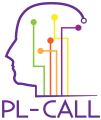Dear PL-CALLers,
It is our pleasure to announce that the conference programme of PL-CALL 2016: Call for mobility – to be held in Kraków, Poland on 2-3 June 2016 – is ready and includes:
- 2 very practical workshops
- 4 excellent keynote speeches and 2 intriguing keynote papers
- 8 paper sessions with 24 inspiring papers reporting on various studies into many different aspects of mobility in language education as well as teacher and translator training.
The complete programme and the book of abstracts can can be found here: http://pl-call.pl/2016-conference-programme/
Enrolment for both workshops is now open – please make your choice by entering your name on one of the lists:
Przemysław Stencel, Moodle zmobilizowany i zgryziony
Michał Mochocki, CALL-to-GALL, DIY
For practical information, please consult: http://pl-call.pl/2016-conference-venue/
See you in Kraków
Conference Organisers
***
PL-CALL 2016: CALL for mobility
CALL FOR PAPERS
After two very successful and intellectually stimulating PL-CALL conferences (2013, Warsaw; 2014, Warsaw) and the PL-CALL day (PL-CALL Between in 2015, Kraków), we are going to convene for the fourth time, on 2-3 June 2016 in Kraków.
The main theme of our 2016 conference is CALL for mobility, which is self-explanatory in today’s world, where everything, including language learning, is increasingly mobilized.
We would like to invite you to submit a paper proposal for the conference. Suggested research and academic practice areas:
- Mobile Assisted Language Learning (MALL)
- gamification in language learning
- designing mobile apps for language learning
- virtual student mobility / intercultural online exchanges (telecollaboration)
- computer-assisted activities stimulating intellectual agility: critical thinking, multiliteracies, etc.
- technology-enhanced explorations of fandoms and other territories
- (broadly understood) mobility in teacher training and translator education
Abstracts (200-word long) should be submitted at registration.
After the conference, selected papers will be published in a peer-reviewed monograph in the Peter Lang series Studies in Computer Assisted Language Learning.
